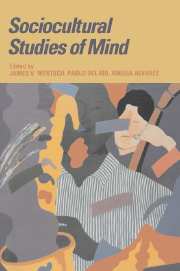Book contents
- Frontmatter
- Contents
- Series Foreword
- List of contributors
- Sociocultural studies: history, action, and mediation
- Part I Human action: historical and theoretical foundations
- Part II Mediation in action
- Part III Sociocultural setting, intersubjectivity, and the formation of the individual
- Part IV Sociocultural settings: design and intervention
- Index
Sociocultural studies: history, action, and mediation
Published online by Cambridge University Press: 05 June 2012
- Frontmatter
- Contents
- Series Foreword
- List of contributors
- Sociocultural studies: history, action, and mediation
- Part I Human action: historical and theoretical foundations
- Part II Mediation in action
- Part III Sociocultural setting, intersubjectivity, and the formation of the individual
- Part IV Sociocultural settings: design and intervention
- Index
Summary
Perhaps it is the fate of every generation to believe it experiences a period of crisis, or at least rapid social change. In the twentieth century alone, several events have been nominated as major crises with their attendant cultural and psychological dimensions. For example, Fussell (1975) has eloquently shown how World War I fundamentally changed poetry and literature along with the general worldview of the English, and Elder (1974) has documented the lasting psychological impact of the Great Depression on Americans. In both cases the focus is on the cultural and psychological dimensions of great social crises, and the assumption is that these dimensions are as central to understanding such events as are economic, political, or other dimensions.
Although armed conflict and economic deprivation remain an all too familiar part of the news today, we are fortunately not in the midst of a world war or a world depression. However, we are in the midst of other major social changes and crises. For example, instead of bringing the prosperity and tranquility expected by many, the end of the Cold War has unleashed a host of major social and political forces that are changing our lives in ways few had anticipated: The forces of globalization have accelerated in a variety of arenas such as finance, economic production, and communication, while simultaneously and somewhat paradoxically, new forces of localism, especially in the form of nationalism, have emerged with their attendant and often brutal consequences.
- Type
- Chapter
- Information
- Sociocultural Studies of Mind , pp. 1 - 34Publisher: Cambridge University PressPrint publication year: 1995
- 87
- Cited by



